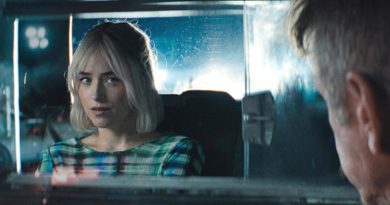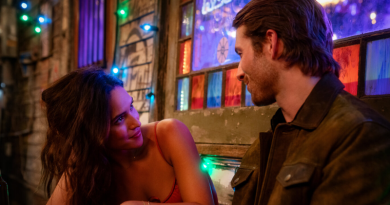Red Rooms (2023) Review: A Perfectly Icy Juliette Gariépy Leads Pascal Plante’s Eerily Ambiguous Psychological Thriller
Red Rooms (a.k.a. Les Chambres rouges) marks Pascal Plante’s foray into the psychological thriller territory after exploring romance drama (2017’s Fake Tattoos a.k.a. Les faux tatouages) and sports genre (2020’s Nadia, Butterfly). His latest movie involves a serial killer, Ludovic Chevalier (a perfectly cold Maxwell McCabe-Lokos) who stands trial for the heinous murders of three teenage girls. The movie begins with a courtroom trial as the crown prosecutor’s opening statement (Natalie Tannous’ Chedid) detailing Chevalier’s brutal acts of rape, murder and mutilation committed against the female victims — Kim (Constance Munger), Justine (Raphaëlle Blanchette) and Camille (Mégane Connelly).
Here, Plante favours lots of long takes reflecting the clinical interior of the courtroom. It looks as if the movie focuses on a legal drama — a battle of words between the crown prosecutor Chedid and the defence lawyer, Fortin (Pierre Chagnon). However, Plante is more interested in taking us to a rarely explored territory in the serial killer-themed psychological thriller: the murder groupies.
The first one is Kelly-Anne (Juliette Gariépy), who shows up in the courthouse on the first day of the highly-publicised trial in Montreal. She has that fixated expression as she witnesses the trial commences. Kelly-Anne’s unhealthy fascination with Chevalier feels strangely out of place for a beautiful young woman like her. She has a successful modelling career and is also tech-savvy living in a swanky apartment with floor-to-ceiling windows overlooking the Montreal cityscape. She made extra money playing online poker and has an elaborate computer setup, complete with an AI nicknamed “Guenièvre” specially programmed just for her.
As the movie continues to unfold in a deliberate slow-burn approach, her character remains ambiguous beyond what we see her as a “groupie” obsessing over Chevalier’s murder trial. But why? Is it just a mere strange hobby or does Kelly-Anne have a dark past connected to Chevalier? Plante doesn’t provide easy answers, which can be a frustrating experience for (most) viewers forced to sit through the two-hour length of the movie wondering about Kelly-Anne’s murky motivation.
And yet, Plante has a knack for using the narrative power of ambiguity to tell an intriguing story of one’s obsession and voyeurism — two common subject matters typically associated with Brian De Palma’s works. Except for Plante does the complete opposite of what De Palma would direct in his signature lurid fashion. We learn about how the masked Chevalier recorded his murder of the three young girls as snuff videos for the dark web, notably the portal called “Red Rooms”, which also served as the title of the movie. But the footage itself is predominantly shown off-screen, relying heavily on the suggestive voice and sound heard from the video while leaving it to the viewer’s imagination to fill in the blanks.
Plante also deserves equal praise for bringing out the best in Juliette Gariépy’s lead performance, who nails Kelly-Anne’s icy demeanour and detached personality beyond her magnetic supermodel beauty. Her character’s underlying enigma makes it all the more unpredictable because we never know what she will do next as we watch the movie.
Red Rooms also introduces another character, who also happens to be a murder groupie played by Laurie Babin in her solid supporting turn as Clementine. But unlike Kelly-Anee, she strongly believes that Chevalier is a victim of the system and he’s not guilty until proven otherwise. Clementine attends the trial as a court spectator like Kelly-Anne and after they come across each other, they become unlikely friends. The fact that Kelly-Anne and Clementine have different, contrasting personalities allows Plante to play around with the possibility of suggesting something might happen for better or worse down the road.
On the technical front, Plante has a knack for steely visuals that mesmerisingly dehumanise the story and characters with the constant hints of dread seeping throughout his movie. The movie deserves equal praise for Dominique Plante’s ominous score and Vincent Biron’s atmospheric cinematography.
I have to admit that Plante’s heavily cryptic direction can be a turn-off at times but overall, Red Rooms remains a hypnotic piece of psychological thriller boosted by Juliette Gariépy and Laurie Babin’s notable performances.





